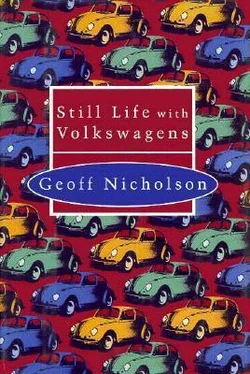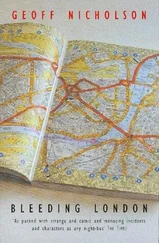So once again he heard what he thought was the sound of another approaching truck, and more or less without thinking, he pulled over; just in time to see a VI flying bomb ‘overtake’ him and explode thirty yards up the road.
♦
The above is a true story, at least it’s as true as I can make it. The story wasn’t told to me directly but came via my friend Steve who worked in road safety in Sheffield. Incidentally, Steve is one of the other dedicatees for Street Sleeper and so far we haven’t fallen out. When I decided that I wanted to include Hilton Cunliffe’s story in this book I asked Steve if he could check the exact details of it; the year, the place in Holland, the name of Hilton Cunliffe’s regiment and so forth. Steve tried, but it was too late, Hilton had died in the years between my hearing the story and wanting to retell it.
♦
In 1934 when Ferdinand Porsche signed the contract to develop the German people’s car, the Type 60 as it was then known, his design business operated from office premises and he had no workshops. Therefore the prototypes had to be built in the garage of his own home in Stuttgart. The pictures show this to have been a fairly grand place and the garage was no doubt roomier than most. He built both a saloon and a cabriolet version of the Type 60, but in order to distinguish between the two models he called the saloon the VI and the cabriolet the V2.
This seems somehow significant, though I’m not entirely sure how. The VI in Porsche’s designation stood for Versuch — experimental. The V in Hitler’s V1 sand V2 sstood for Vergeltungswaffe — retaliatory weapon. It’s also worth noting that the VI was known in England as the Doodlebug.
Of course, if it had been a V2 rocket coming up the road behind Hilton Cunliffe, it would have been flying faster than the speed of sound, he would never have heard it, never have pulled over and never known what hit him.
Six.Paint Your Volkswagen
The first skinhead says, “What if we went down Brick Lane and did over a few Indian restaurants?”
“It’s definitely a possibility,” says Phelan.
“Or,” says another, “what if we went to a Jewish cemetery and, you know, knocked over a few gravestones and painted ‘em with swastikas?”
“Why not?” says Phelan approvingly. “Crude perhaps, but undeniably resonant.”
They are in a scout hut adjacent to some overgrown allotments somewhere within striking distance of the M25. Phelan is having what he calls a Mission Session. He is instructing, persuading, motivating, setting goals. His audience consists of eight skinheads, the same ones who attacked Barry at the Little Eater and who previously destroyed the New Age travellers’ campsite. He tells his charges that they are only one cell of a growing movement, but he flatters them into thinking they are his crack squad, his storm troopers. The room is brightly lit and bare. There is no stage, no podium, no backdrop of Nazi flags. Phelan believes there will be a time for oratory, for the big rally and the triumph of the will. That time is coming soon but it has not arrived yet. For now he chooses to remain low-key, makes one or two allusions to the effect that the Western world is in thrall to a cabal of ‘international bankers’, but generally remains informal, intimate, a style that is interestingly at odds with the exuberance of the skinheads, and yet he feels wonderfully safe and in control when he talks to them. He feels they are his skinheads.
“What about doing over a rap club?” one skinhead says. “I hate rap music. I hate niggers, of course, but I hate rap music even when whites play it.”
“Well,” says Phelan, “mightn’t it be more interesting to attack a club that was, say, frequented by black drug dealers? That would be morally ambiguous. That would give the liberal press something to think about.”
His audience are not the type to give much consideration to the thoughts of the liberal press, but Phelan sounds as convincing as ever.
“And maybe we could burn some crosses,” one of the skinheads shouts.
The others like this and for a while they become uncontrollably wild and exuberant. After this has died down one says, “I hear there are these things called gay centres. Fuck knows what they are, but I wouldn’t mind smashing one of ‘em up.”
Phelan smiles approvingly. He enjoys these little chats. What he likes best is the noble savagery, the instinctive correctness of these young men. He is a thinker. He has theory and ideology behind him. He knows why he wants an end to immigration, to political softness, to social and sexual divergence. The skinheads don’t, and yet they’ve come to the same conclusions as him. They have a natural, unthinking energy that he knows he is too studied to possess. But he can admire it, and he can most definitely use it.
“What about massage parlours?” one of the skinheads shouts. “I mean, all that sensual massage and hand relief that goes on, that can’t be right, can it?”
“No, I don’t think it can,” Phelan agrees.
“And what about building societies?” another yells. “I ‘ate fuckin’ building societies. And banks. I wouldn’t mind doing over a few of them.”
“Ah, usury,” says Phelan, but this rather goes over their heads.
Butcher, the gang’s driver, has been unusually silent throughout the meeting. He has been looking at his boots, chewing his already chewed-up nails. Phelan doesn’t like it when one of his boys has moods. It makes him uneasy. It makes him feel less in control.
“Why so silent, Butcher?” he asks. “Something wrong?”
Butcher remains surly, and says nothing.
“Come on, Butcher. You can tell me.”
“All right then. I think all these big ideas of yours are crap.”
“And why exactly do you think that, Butcher?”
“Because beating up nignogs and doing over graveyards is all very well, but it’s no bloody good if you haven’t got reliable transport.”
“I’m not sure that I follow,” says Phelan.
“Look, I’m bloody sick and tired of driving around in that crappy old white van. It keeps letting us down. I want a decent fuckin’ set of wheels.”
The others have never given this a moment’s thought but they immediately see that Butcher is right.
“And what do you think constitutes a decent set of wheels?” Phelan asks, suddenly the school master.
“A tasty old Jag,” someone says.
“Nah, a Ford Capri.”
“Nah, a BMW,” says another.
“Bollocks,” says Butcher with feeling. “It’s got to be a Volkswagen Beetle.”
“And why’s that?” Phelan asks, hoping he knows the answer.
“Because it’s a Nazi car, isn’t it?” says Butcher. “Because it’s the car Adolf Hitler dreamed up.”
“You know Butcher,” says Phelan, “sometimes your instinctive grasp of theory leaves me breathless with admiration.”
It is some time before Butcher is certain that Phelan isn’t taking the piss.
♦
The yellow Beetle belonging to Renata Gas well, the one that Fat Les deliberately backed into, stands proudly on the forecourt of Fat Volkz Inc. To say that it now looks as good as new would be a pathetic understatement. It looks better than it ever has, better than when it was first in the showroom. It looks magnificent, resplendent, luminous. This is not so very surprising. This, after all, is what Fat Les does with Volkswagens.
Renata stands admiring her car. Next to her is Phelan and beside him is Butcher. They too are taking great pleasure in looking at Les’s handiwork. Les, not a man burdened by extravagant modesty, receives their admiration as no more than his due.
“It’s seriously nice,” says Renata.
Читать дальше












